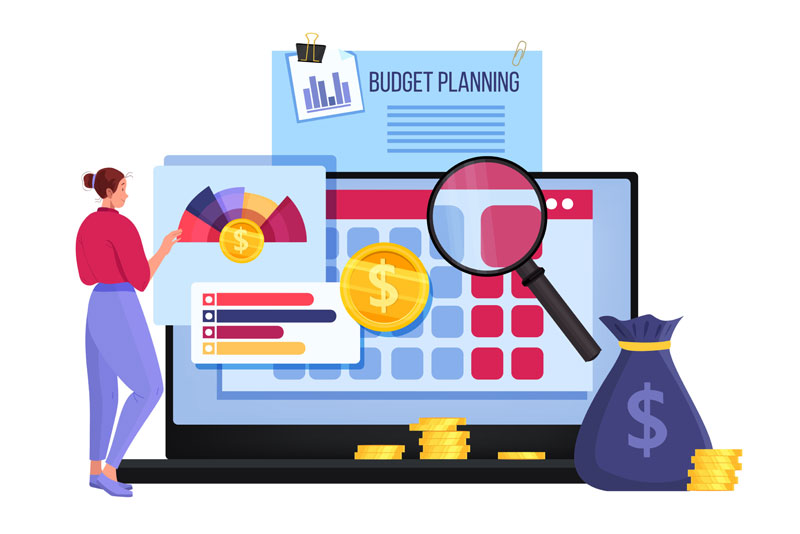Preparation matters when launching a business. And knowing your startup and ongoing costs is among the most important steps of the process. It’s critical for seeking funding, attracting investors, and estimating when you’ll break even and begin turning a profit. But every entrepreneur’s situation is unique, and many factors influence the types (and amounts) of expenses a business will have. So the vague but honest answer to how much does it cost to start a business is it depends.
Sadly, many new businesses face dire financial difficulties. According to Lending Tree’s analysis of Bureau of Labor Statistics, one in five U.S. businesses fail within the first year. And nearly half (49.7 percent), fail within five years. It’s logical to conclude that some of those failures may have occurred because entrepreneurs didn’t have a firm understanding of how much it takes to start and run a business.
To help demystify the exercise of determining your business costs, I’ve shared some insight and considerations below.
Types of Expenses Businesses Have
Business expenses are the costs associated with starting and operating a business. It’s critical to estimate expenses as accurately as possible when developing a business plan. And after a business is up and running, the business owner must track company costs closely as they directly impact profitability. If a business’s costs exceed its income for an extended period, it will not survive long-term. It’s a matter of math!
One-time Vs. Recurring Costs
- One-time Business Expenses – Some expenses are once and done during the startup process. For example, forming a Limited Liability Company requires a one-time filing fee when submitting Articles of Organization to register the business entity in the state.
- Recurring Expenses – Recurring costs are those that are ongoing. A business pays them on a regular basis (i.e., weekly, monthly, quarterly, annually, etc.). Rent, utilities, and payroll are examples of recurring business expenses. Recurring business expenses fall into one of three categories: fixed, semi-fixed, or variable.
Read More About Payroll: What is Payroll?, Registering for Payroll Taxes
Fixed Costs
These ongoing costs are essentially the same from month to month (or quarter to quarter or year to year). Their predictability makes them fairly easy to forecast and prepare a budget for. Fixed cost examples include:
- Rent or mortgage
- Wages and salaries
- Insurance
- Property taxes
- Marketing costs
- Utility costs that do not change based on usage (e.g., trash, internet access)
Semi-Fixed Costs
Semi-fixed costs (also known as semi-variable or mixed costs) have some ebb and flow. Because they have a combination of fixed and variable components, they may fluctuate — but not in direct proportion to the production of goods or services. Semi-fixed cost examples include:
- Vehicle expenses – e.g., when there’s a fixed loan payment and variable fuel expenses
- Salaried sales staff – e.g., when they have a fixed salary and variable compensation component (commission)
- Phone expenses – e.g., when there’s a fixed phone plan fee and variable usage fees for add-on services or exceeding data, text, or call limits
Variable Costs
Variable costs fluctuate. These costs decrease or increase according to the production of goods or services and sales activity. Variable cost examples include:
- Inventory
- Raw materials used to make products
- Labor compensated on a piece-rate basis (amount paid to a worker to complete a product or component)
- Sales commissions
- Shipping and delivery costs
How to Estimate Startup Costs for a Business
Consider using the list of questions below as a guide for homing in on the startup expenses a business will need:
- Will the business rent space, purchase property, or be operated out of the business owner’s home?
- Does the business serve customers in person or online?
- Where will the business get legal, accounting, and tax guidance?
- Will the business operate as a Sole Proprietorship, Limited Liability Company, or C Corporation? What filing fees are associated with forming the business entity?
- What utilities will the business need (e.g., electricity, heating oil, internet access, etc.)
- What furniture will the business need (e.g., chairs, desks, tables, display cases, shelves, etc.)?
- What equipment and technology will the business need to produce its goods or services (e.g., machinery, software applications, etc.)?
- What equipment and technology will the business need for managing its administrative activities (e.g., computers, phones, printers, customer relationship management software, accounting software, etc.)?
- Will the business need an alarm or security system?
- Will the business need to buy inventory or raw materials? If yes, will it need to rent storage space?
- Will the business ship products to customers?
- What types of insurance will the business need (e.g., general liability, errors and omissions, auto, hazard, etc.) to protect its assets?
- Does the business need business licenses and permits at the local, county, state, or federal level?
- Will the business be using a professional website developer or designer? If so, will the website need e-commerce or other special capabilities?
- What other marketing and advertising materials will the business need?
- Will the business hire employees or outsource work to independent contractors?
- What taxes will the business and business owner be responsible for?
- Will the business handle its own business formation, compliance filings, and tax paperwork?
- What industry associations and networking groups will the business be a part of?
After compiling a list of expenses, entrepreneurs can then research the estimated costs for each item. Some expenses will have clear, well-defined prices, such as the filing fee to incorporate a business and license fees. Others may depend on the supplier or vendor, so the business owner will have to reach out to multiple sources for determining cost expectations. And then there are other expenses, like monthly electric bills, that may require some guesswork.
Tax-Deductible Business Expenses
No. According to the IRS, business expenses must be “ordinary and necessary” to be tax-deductible. The IRS allows some expenses to be fully deductible while others are partially deductible. Examples of fully or partially deductible business expenses:
- Business property mortgage payments
- Office rent or lease payments
- Home office expenses
- Legal fees
- Insurance premiums
- Memberships dues
- Software purchases and subscription fees
- Employee wages, salaries, and commissions
- Payments to independent contractors
- Marketing and advertising
- Office supplies and equipment
- Office furniture
- Inventory purchases
- Costs of goods sold (materials required to make products or provide services)
Tips for Managing Business Expenses
1. Write a Business Plan
A business plan serves as a roadmap to the entrepreneur in looking at all aspects involved in starting and operating a company. It helps business owners better understand their industry, market, and competition. Moreover, it helps equip business owners to identify the types of materials, vendors, suppliers, and other resources they’ll need. Through the process of preparing a business plan, entrepreneurs can assess the viability of their business idea and identify red flags before they put significant money, time, and energy into their endeavor. Learn more about creating a business plan for your startup.
2. Keep Fluctuations in Mind When Forecasting
The unexpected can and does happen, so it’s helpful to keep that in mind when forecasting business expenses. It’s important for business owners to not underestimate their costs. On a similar note, it’s important to not overestimate expected sales and revenue.
3. Get Insight from Others
We’ve all heard the phrase, “You don’t know what you don’t know.” That’s true when starting a business and trying to get a grip on how much everything will cost. Look for online resources, talk with vendors and suppliers, and leverage business mentors (such as those at SCORE) and other business professionals who can offer insight based on their experience and knowledge.
4. Plan Where the Money Will Come From
Some types of businesses need minimal capital while others require a lot of money in the early stages. Entrepreneurs typically rely on one or more funding options when starting their companies. Examples of funding include the business owner’s personal checking and savings accounts, money from friends and family, bank and credit union loans, grants and economic development programs, outside investors, and crowdfunding sites (e.g., Kickstarter).
5. Pay Attention to Cash Flow
The flow of money in and out of a business can make or break its sustainability. If the majority of expenses are due at the start of the month but the majority of income arrives mid-month, a business may not be able to pay its bills on time. That may lead to late fees, penalties, and a hit to the company’s credit score.
6. Use a Startup Calculator
Many tools exist online for estimating startup costs (and how they will affect a company’s profitability). Consider using one to help you identify and understand the expenses you may expect when launching your business. Examples of good startup calculators include SBA Break-Even Analysis Calculator, SCORE Start-Up Expenses Template, and Small Biz Trends Startup Calculator.
CorpNet Can Help
How much money do you need to start your business? CorpNet can help by identifying the filing fees for registering your business entity, researching your business license and permit needs, and assisting with your other business formation and compliance requirements. Contact us now to save time and get one step closer to launching your business!
We’re Here to Help You Start Your Business Right
It’s common to have a lot of questions before diving into entrepreneurship. We’d like to help get you started by offering a free consultation with one of our business formation experts.






